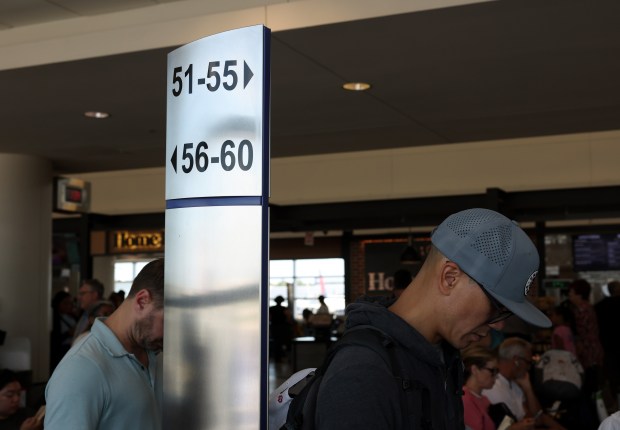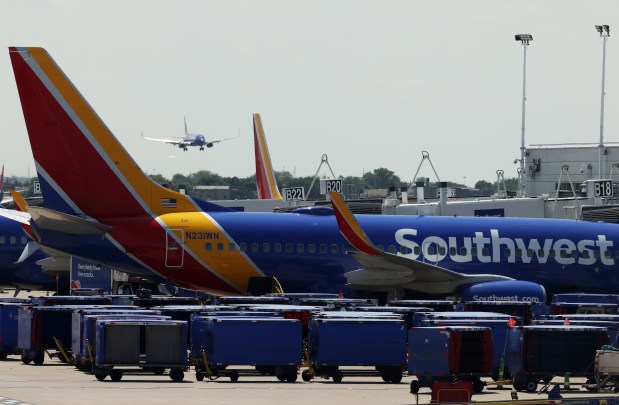At Midway International Airport, Amy Schuber gathered her three young children near baggage claim with her husband Thursday afternoon. She was heading back to her home in Oswego after a nearly weeklong vacation in Tampa.
The 37-year-old was happy with her Southwest flight, namely the relatively cheap price and ability to bring two checked bags for free. But something that can cause a headache, she said, is not having a guarantee that her whole group can sit together.
This won’t be a worry for much longer. The airline announced Thursday that it will start assigning seats and offering premium seating for customers seeking more legroom, a change some loyal travelers at Chicago’s airports said they welcome — if it doesn’t raise ticket prices.
As the dominant airline at the Southwest Side airport, Southwest is used by many Chicagoans and visitors to the city. The airline has some service at O’Hare International Airport, although it moved to trim flights in April.
The airline said it changed its 50-year model in response to changing consumer preferences, with travelers booking longer flights and wanting an assigned seat. Surveys showed 80% of its customers, and 86% of potential customers preferred assigned seating, and the top reason passengers selected a different airline was Southwest’s open seating policy, the company said in a statement. It hopes the moves will generate revenue and boost its financial performance.
During Schuber’s flight, she said she had to go to the back of the plane to find a spot to sit with her kids, an 8-, 5- and 2-year-old. While she’s appreciative of Southwest’s family boarding — which allows two adults traveling with a child 6 years old or younger to board between the “A” and “B” group — it would be nice to know where they are seated beforehand.
When asked if she would take advantage of the new policy, she replied “Oh yeah.”
Henry Harteveldt, an aviation industry analyst who said he’s previously worked with Southwest, said it’s a “terrific move” by the airline that will please many customers and attract new ones. It will “take away all of the drama” from open seating, which Harteveldt called “boarding bingo.”
Southwest’s boarding process started as a way to quickly load passengers, limiting the time planes and crews spent sitting idly on the ground. In the beginning, the first 30 to check in were put in the coveted “A” boarding group, guaranteeing them a window or aisle seat. Dawdlers landed in “B,” which was still OK, or “C,” which would often result in a middle seat.
While it helped the airline operate more efficiently and even squeeze a few more flights into the daily schedule, the system became less democratic over time as Southwest let people pay extra to guarantee a spot near the front of the line.
“Some people like the community that is built in the boarding lines, and open seating has been a hallmark of how Southwest has operated for more than 52 years,” Harteveldt said. “But no business stays the same in a 50-year-plus operating history, and this evolution of how Southwest is going to do business makes a lot of sense.”
Leena Saleh, 27, flew into Midway Thursday from Florida to visit family. She never particularly minded open-seating, but said it would be convenient to sit by her husband when she doesn’t fly alone.
“I would definitely (select a seat) if it doesn’t have any added money, like with some flights you can choose if you put money toward it,” she said.
Ann Gabriel, who is visiting Chicago from Columbus for her cousin’s granddaughter’s quinceañera, agreed. She said as long as the prices stay reasonable and she can check in early she’s fine with the change.
“They have the free bags,” the 75-year-old said. “It’s a little bit of a cattle call when you get on, but there’s plenty of room.”
Southwest also plans to sell premium seating with more legroom — matching a practice that is standard among other large U.S. carriers — and to offer redeye flights for the first time, starting Feb. 14, on nonstop routes including Las Vegas to Baltimore and Orlando; Los Angeles to Baltimore and Nashville; and Phoenix to Baltimore, with more routes added over time.

Extra legroom options, in previously all-coach cabins, will help Southwest increase its competitiveness in the market, Harteveldt said, as airlines struggle with higher costs and reduced pricing power, especially on domestic flights. Harteveldt anticipates Southwest will leverage the new seat assignment model to promote its rewards program and credit card, offering loyal customers free or early access to top seats.
Southwest, based in Dallas, announced the changes on the same day both it and American Airlines reported a steep drop in second-quarter profit despite higher revenue. The airline is under pressure from Elliott Investment Management, which argues that the airline lags rivals in financial performance.
Harteveldt pointed to the airline’s decision to keep its two free checked bags policy, despite investor pressure, as an example of it balancing its financial gains and customer satisfaction.
“I think that Southwest does want to find ways to find a balance between improving its revenue, giving customers much more control over their journey, but also still being fair to customers,” Harteveldt said. “And so it remains this relatively egalitarian airline.”
Southwest also faces increased scrutiny from the Federal Aviation Administration after a series of worrisome flights, including one that dove within 400 feet of the ocean off Hawaii, although it avoided criticism during last week’s global tech outage that left many of its competitors’ planes grounded and passengers scrambling.
The Associated Press contributed.



